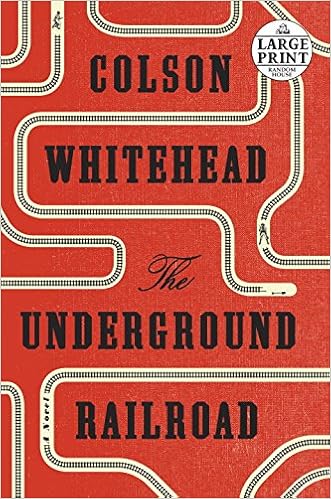 An unflinching look at slavery and fugitive slaves, Colson Whitehead doesn't romanticize the era, neither slave nor slaveowner, doesn't elevate anyone to a status of hero or villain. The protagonist, Cora, is certainly the hero of the novel, but her acts of violence leave her feeling guilty and mark her as less than good. And the antagonist, the slave catcher Ridgeway, is just making a living carrying out the law of the land, as inhumane as that law was. While the underground railroad that Whitehead portrays is a fantasy, a literal railroad under the ground, the story of slavery is a real one, a harsh reality that reveals the depths of depravity that the people of the United States of America, the country of equality, had once reached. Whitehead shows how slavery not only brought down slaves and blacks as a whole, but was also harmful to whites. In her attempt to escape, Cora learns that it's not so easy to shake off the shackles of slavery and its deleterious effects remain for a long time.
An unflinching look at slavery and fugitive slaves, Colson Whitehead doesn't romanticize the era, neither slave nor slaveowner, doesn't elevate anyone to a status of hero or villain. The protagonist, Cora, is certainly the hero of the novel, but her acts of violence leave her feeling guilty and mark her as less than good. And the antagonist, the slave catcher Ridgeway, is just making a living carrying out the law of the land, as inhumane as that law was. While the underground railroad that Whitehead portrays is a fantasy, a literal railroad under the ground, the story of slavery is a real one, a harsh reality that reveals the depths of depravity that the people of the United States of America, the country of equality, had once reached. Whitehead shows how slavery not only brought down slaves and blacks as a whole, but was also harmful to whites. In her attempt to escape, Cora learns that it's not so easy to shake off the shackles of slavery and its deleterious effects remain for a long time.Cora's grandmother was a first generation slave, having traveled from plantation to plantation until ending up in Georgia on the Randall farm. Cora's mother, Mabel, was famed as the only slave to escape the farm successfully, and Cora never forgave her for leaving her behind. But a more learned slave, Caesar, who winds up on the farm when his previous owner duplicitously split his family up, seeks her help to escape. Cora's reluctant. Successful escapes are rare. The whole country is turned against the slave and slave catchers can be ruthless in their hunt. And those who escape often meet horrendous ends. Of course she relents, or there would be no story. Her owner, James, passes away and is replaced by his brother, Terrence, a cruel, vicious man who marks her as his by slipping his hand down her shirt in front of the whole plantation.
While the history books portray slave escapes in simple terms, heroicizing the person who helps the slave fugitive, Whitehead shows the whole process to be messy and bumbling, full of errors. The person helping the slaves escape is not always kind-hearted, but hardened to the work, fearful of discovery, even cowardly. Even the escaping slave is not a model of moral virtue, no Uncle Tom. Cora, in her escape, kills a twelve-year-old boy. Yes, he was trying to capture her and she was fighting for her life, but at twelve, he was innocent, and the charge of murder is a dangerous label for the runaways. It's also a taint on her character. Slavery has shaped her into a vicious person, especially when she senses her life is in danger, and has hardened her from any softness except in rare instances.
I mention romanticism and heroics because often that's how stories of slavery are painted, whether historical or fictional. Many stories about slavery are often concerned with whether a master is kind or cruel, as if that trumps the fact that the slave is a piece of property and not a human being. The slave is portrayed as morally pure, religious, and loving. This strips them of their humanity - no person fits all of those qualities so perfectly. There's a scene where Cora earns work in a museum as a living exhibit piece on a set about slavery. She soon realizes that the slaves are the only ones played by real people. All of the white actors are mannequins. This gives the impression of Cora as a creature in a zoo exhibit. Plus, Cora notices that the stories the exhibit shares about slavery don't mesh with reality. I've visited my share of museums showing slavery in a way that strips it of its violence. Whitehead wants to dispel that myth, of ignoring the bloody violence of the institution. This is made clear when a fugitive slave returned to the Randall farm is punished by having his genitals cut from him, sewn in his mouth, and after three days he is burned alive.
Whitehead's prose is detached and choppy. He uses sentence fragments throughout and his style lacks any smoothness. It's rough, just like the treatment of slaves. Detached as the narrator is, Whitehead doesn't allow this narrator to keep emotional weight at bay. This is an emotionally powerful story, full of suspense, despair, sorrow, and, at times, even triumph. It's also an action-packed story, carrying the reader across several states, lulling the reader and characters into false senses of security before stripping it away. At times Whitehead does spend a bit much time on tangents, philosophizing on the personhood of the slave. While interesting, it does slow down the plot and it's not anything new for those versed on their slavery history. Yet it's only natural that he includes these passages. This is a thoughtful work, one that is filled with powerful moments and never dull.
No comments:
Post a Comment